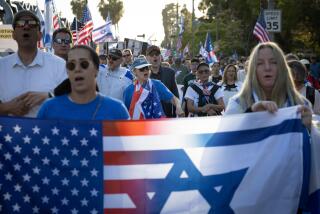Religious Literacy Pays Off
The FBI has been investigating a number of possible hate crimes, including some murders, in the aftermath of the terror bombings, and some Arab Americans report ugly incidents of taunting. But there is a larger picture, showing that organized interfaith and human relations efforts by churches and schools may be paying dividends.
At a mosque in Washington on Monday, President Bush quoted from the Koran and said anti-Islamic sentiment should not be tolerated. Southern California’s Muzammil Siddiqi, president of the Islamic Society of North America, was at Bush’s side during a service Sept. 14 at Washington’s National Cathedral. Arab American and Muslim leaders have conveyed their sorrow and anger over the terrorism of Sept. 11, and many report receiving expressions of support.
The Fountain Valley-based Council on Islamic Education sees a positive shift in public opinion and understanding of Islam since the 1995 Oklahoma City bombing. Part of the reason is that interfaith dialogue, which took root in the 1970s, has gone mainstream.
The U.S. Conference of Catholic Bishops, in an initiative headed by Bishop Todd D. Brown of the Diocese of Orange, has for some time been holding regional conversations with Muslim leaders in three parts of the country. Muslims were part of the Interfaith Coalition to Heal Los Angeles, an effort to improve communication between faith communities and shore up deteriorating neighborhoods after the 1992 riots. Southern California Muslim and Jewish leaders have worked to keep alive a difficult dialogue on the Mideast that they began in 1998. The Council on Islamic Education has collaborated for a decade with national book publishers and, recently, with the Freedom Forum to promote a better understanding of Islam in school textbooks.
The understanding generated by scholars and clergy is now finding its way into the thinking of congregations and the larger community. Horrible things may still occur in the coming days, but the country as a whole does seem on the way to greater religious and cultural “literacy.” That’s especially so in urban centers, such as Southern California, home to about 600,000 Muslims.
Americans increasingly seem capable of grasping distinctions between real theology and the hate-filled rhetoric of the radical militants, who are twisting and exploiting the message of Islam. Bookstores carry the Koran. Muslim neighbors share similar concerns and bring fresh enthusiasm to the American experience. Lessons on mutual tolerance being conducted in schools can help inoculate future generations against stereotyping.
We may not have reached a full reckoning with our American melting pot, but the value of continuing to try has never been more evident than during this crisis.
More to Read
Sign up for Essential California
The most important California stories and recommendations in your inbox every morning.
You may occasionally receive promotional content from the Los Angeles Times.










